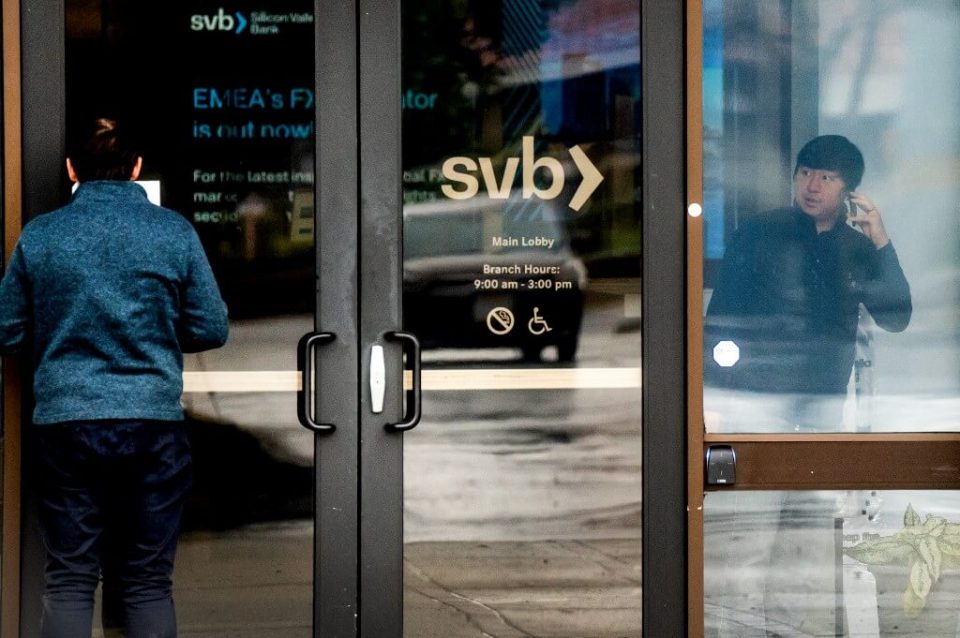By Michael Mathes, with Thomas Urbain in New York
Agence France-Presse
(AFP) — President Joe Biden sought to reassure Americans over the country’s banking system Monday, while insisting emergency measures would not be paid for by taxpayers as additional banks came under stress.
SVB — a key lender to startups across the United States since the 1980s — collapsed after a sudden run on deposits, prompting regulators to seize control Friday.

On Sunday night, US federal authorities stepped in to ensure depositors still had access to their funds at SVB and regulators took over a second troubled lender.
“Americans can have confidence that the banking system is safe. Your deposits will be there when you need them,” Biden said in brief televised remarks from the White House.
Most financial market watchers are optimistic that the currency upheaval will not be comparable to the 2008 financial crisis, although the problems are seen as boosting the odds of a recession.
Major US stock indices opened lower but pushed into positive territory Monday in a volatile market, even as there were immediate signs of pressure at additional financial players.
San Francisco-based First Republic Bank shares plunged more than 65 percent.
“The concern is that you’re going to see more individuals, retail individuals, worry about the safety of their banks, and their deposits,” said Quincy Krosby of LPL Financial.
“This is where right now, it is an issue of confidence,” Krosby added. “Contagion is pure fear, absolute fear, absolute lack of confidence.”
– ‘Immediate’ action –
Biden praised the “immediate” action taken by officials to avert further problems.
In a joint statement on Sunday, the US Federal Reserve, the Federal Deposit Insurance Corporation (FDIC) and the Treasury Department said SVB depositors would have access to “all of their money” starting Monday.
They added that depositors in Signature Bank — a New York-based regional-size lender with significant cryptocurrency exposure that was shuttered on Sunday after its stock price tanked — would also be “made whole.”
The Fed announced it would make extra funding available to banks to help them meet the needs of depositors, which would include withdrawals.
Biden on Monday challenged Congress to enact more stringent regulations, saying that “tough” safeguards brought in after the 2008 financial collapse had been undone under his Republican predecessor Donald Trump.
While the government is ensuring that SVB depositors get their money back, “no losses will be borne by the taxpayers,” Biden said.
“The money will come from the fees that banks pay into the deposit insurance.”
– European stocks fall –
In Britain, banking giant HSBC bought SVB’s UK division for just £1 ($1.2) in a rescue deal overseen by the Bank of England and the government. However, French and German authorities said there were no risks to their financial systems.
The British government’s SVB UK rescue deal also guarantees deposits of customers, which includes major businesses in the technology and life science sectors.
Germany’s finance watchdog said the “distressed situation” of SVB’s German branch “does not pose a threat to financial stability.”
However, European stock markets fell deeper into the red on Monday and most Asian indices finished lower, with banks taking a hit.
“The contagion risk remains for small banks with highly rate-sensitive clients,” said Ipek Ozkardeskaya, senior analyst at Swissquote Bank.
– Avoiding contagion –
Little known to the general public, SVB specialized in financing startups and had become the 16th largest US bank by assets: at the end of 2022, it had $209 billion in assets and approximately $175.4 billion in deposits.
Hours before Sunday’s joint statement, Treasury Secretary Janet Yellen told CBS that the US government wanted “to make sure that the troubles that exist at one bank don’t create contagion to others that are sound.”
Since Friday, there have been calls from the tech and finance sectors for a bailout, which Yellen ruled out.
Yellen said reforms made after the 2008 financial crisis meant the government was not considering this option for SVB.
© Agence France-Presse
© Agence France-Presse
